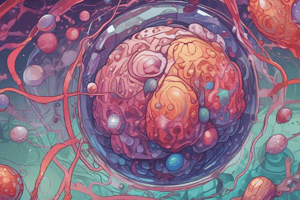Podcast
Questions and Answers
What is the primary characteristic of autacoids?
What is the primary characteristic of autacoids?
- They are locally produced and influence cell and tissue function in a demand-driven manner (correct)
- They are produced in neurons and stored in vesicles
- They are exogenously administered to modulate immune responses
- They are stored in glands and released in response to demand
How do autacoids differ from hormones and neurotransmitters in terms of storage?
How do autacoids differ from hormones and neurotransmitters in terms of storage?
- Stored in vesicles within neurons
- Stored in glands or tissues
- Stored in membranes (correct)
- Stored in the blood
Which field of study has emerged focusing on lipid autacoids?
Which field of study has emerged focusing on lipid autacoids?
- Chronic pain states research (correct)
- Neuroscience
- Endocrinology
- Pharmacokinetics
How do autacoids influence cellular function?
How do autacoids influence cellular function?
In what manner do autacoids modulate immune processes?
In what manner do autacoids modulate immune processes?
When was the term 'autacoid' used less frequently?
When was the term 'autacoid' used less frequently?
Study Notes
Autacoids are locally produced modulating factors that influence the function of cells and tissues in a demand-driven manner. They are endogenous substances with complex physiologic and pathophysiologic functions and have non-autonomic pharmacologic effects. These substances have been found to play a significant role in modulating the immune and inflammatory responses.
The identification of lipid autacoids has given rise to a new field of study, focusing on their potential role in chronic pain states. While the term "autacoid" has been used less frequently since 1992, its relevance in understanding the complex interactions between cells, tissues, and their modulating factors remains critical.
Autacoids can be classified into various categories, such as hormones, neurotransmitters, and autacoids. Hormones are typically produced in glands or tissues and stored in those locations, while neurotransmitters are produced in neurons and stored in vesicles within the neuron. Autacoids, on the other hand, are produced in cells and can be stored in membranes. They bind to membrane or nuclear receptors and can influence cellular function through various mechanisms.
Autacoids are involved in the regulation of various physiologic processes, and they can influence the immune process at different stages. They can also modulate the functions of different subpopulations of cells at concentrations that likely exist endogenously during inflammation and immune responses.
The decline in the use of the term "autacoid" does not diminish its importance in understanding the complex interactions between cells, tissues, and their modulating factors. In fact, the concept of autacoids has become a valuable tool for researchers and clinicians in understanding and treating various pathologic conditions.
In summary, autacoids are a critical class of locally produced modulating factors that play a significant role in shaping the function of cells and tissues. They have been found to be involved in various physiologic and pathophysiologic processes, including inflammation and immune responses, and have the potential to serve as alternatives to conventional drugs for treating chronic pain states and other conditions.
Studying That Suits You
Use AI to generate personalized quizzes and flashcards to suit your learning preferences.
Description
Test your knowledge on autacoids, which are locally produced modulating factors that influence cellular function in a demand-driven manner. Explore the classification, physiologic functions, and relevance of autacoids in understanding inflammation, immune responses, and chronic pain states.




